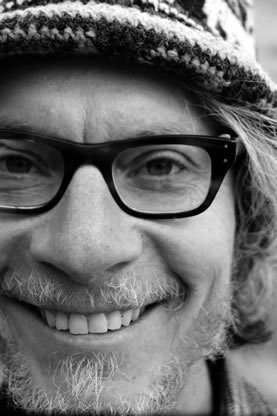For more than 11 years I’ve lived without money, government assistance, or conscious barter. I live primarily in a cave in a Utah canyon, when I’m not wandering. Occasionally I house-sit, though I never ask for house-sits; they just come to me. My food comes from what I find in dumpsters, wild edibles, and what people freely offer. My clothes are cast-offs.

My decision to live without money was conceived on a backpacking trip to Alaska in 1998. I camped on the Kenai Peninsula, surrounded by pine forests, fluorescent fireweed meadows, soaring bald eagles, spawning salmon, and moose and bears bearing babies. Every living thing displayed its glory that Alaskan summer. The symphonic harmony astounded me.
I honed in on the berry section of the orchestra. I noticed the berries along footpaths were more plentiful than elsewhere. Over a couple of weeks, I gorged on raspberries, noticing the ones near my tent becoming redder, plumper, and sweeter than the others. Natural selection, I figured. I’d always thought the idea of talking to plants and trees a bit hokey, but I couldn’t help but sense my raspberry neighbors speaking to me. They spoke through a language of color, size, smell, and sweetness: “Stay, eat!” Ripe raspberries, unlike greener ones, offered themselves, clusters easily pulling off branches as a woolen cap is pulled off the head when one comes inside from the cold. It was strange to feel intimacy from bushes, of all things. It was like Holy Communion: “This is my body. Take, eat.”
The raspberry bush expected nothing in return and I took from it without a sense of debt. Yet the bush and I mutually benefited in a perfect, pay-it-forward economy. Instinctually, I’d walk a good distance from my camp and poop. I realized pooping was a holy act, simply because it was ego-less, without a self-righteous sense of generosity. The bush paid it forward to me, I paid it forward to somebody else. My turds, revolting to me, were sweet manna from heaven to tiny populations in the soil. Not only that, but my manna included the bonus of seeds, propagating raspberry posterity.
There in the woods I felt a therapeutic relief absent in commercial civilization. I reaped what somebody else had sown, sowed what somebody else would reap. This was not the tedium of the sow-and-reap trade economy of commercial civilization – not barter, money, or conventional agriculture. In wild nature I witnessed no consciousness of credit and debt, no value judgments, no imbalance. I could see no difference between work and play.
Thus began a hypothesis of why wild nature’s economy is balanced while the commercial economy is not and can never be. I saw that nature is a constant free current – a true currency, that is. Money and possession represent our control, our interruption, of nature’s current, both in our minds and in our environment. Thus money is not a functional currency. Our belief in money represents our lack of trust in nature’s ability to balance positive with negative, credit with debt. Possession means control, and goes against the current. Free means without possession. Free market is an oxymoron.
I saw then that commercial civilization can never succeed in coming into balance with the environment. The more we try to create balance, the more imbalance we create. A martial artist, tightrope-walker, or dancer understands this principle. The more self-conscious you are, left foot conscious of right foot, the more you stumble. Only by freely giving and receiving – without self-credit (praise) or self-debt (guilt) – can balance come. This means giving up consciousness of credit and debt, not worrying who gets what credit, who owes what to whom. It means no more delusion of possession, property, and control. To be natural is to be graceful – to be in a state of grace, a word that comes from the same Latin root as gratis, or free.
After this Alaskan glimmer of wild nature, it would take me two more years to gain the courage to renounce money and conscious barter, to put my hypothesis to the test. I still find consciousness of credit and debt infecting my mind. But the longer I test my hypothesis, the less it is an experiment, the more it is a natural practice of true life, wild life.
We don’t have a paywall because, as a nonprofit publication, our mission is to inform, educate and inspire action to protect our living world. Which is why we rely on readers like you for support. If you believe in the work we do, please consider making a tax-deductible year-end donation to our Green Journalism Fund.
DonateGet four issues of the magazine at the discounted rate of $20.